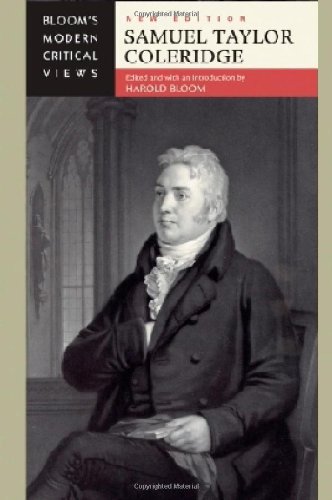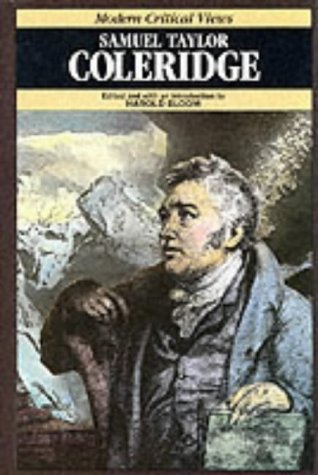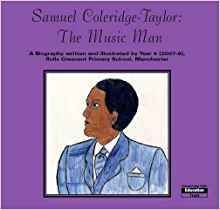-
Samuel Taylor Coleridge
Harold Bloom
Library Binding (Chelsea House Pub, March 1, 2010)Each book in the series provides a complex critical portrait of one of the most influential writers in the world and includes an introduction by Harold Bloom, a useful chronology and a concise bibliography.
-
Poems of Samuel Taylor Coleridge
Samuel Taylor Coleridge
Hardcover (The Easton Press, March 24, 1995)None
-
Samuel Taylor Coleridge
Harold Bloom
Library Binding (Chelsea House Pub, March 1, 2001)Book by
-
Samuel Taylor Coleridge
Samuel Taylor Coleridge, H. J. Jackson
Paperback (Oxford University Press, Jan. 2, 1986)This volume contains a substantial selection of Coleridge's poetry, the complete Biographia Literaria, generous extracts from other prose works, and a sampling of his more informal writings.
-
Samuel Taylor Coleridge
Harold Bloom
Hardcover (Chelsea House Pub, July 1, 1986)Coleridge's poetry often overshadows the brilliance of the other forms of writing he chose to pursue. His critical work reveals a wealth of profoundly sensitive observations and a prophetic vision of compelling authenticity. Examine some of his works and poetry, including Kubla Kahn, and his theory of secondary imagination. This title, Samuel Taylor Coleridge, part of Chelsea House Publishers Modern Critical Views series, examines the major works of Samuel Taylor Coleridge through full-length critical essays by expert literary critics. In addition, this title features a short biography on Samuel Taylor Coleridge, a chronology of the authors life, and an introductory essay written by Harold Bloom, Sterling Professor of the Humanities, Yale University.
-
Samuel Taylor Coleridge
Samuel Taylor Coleridge, H. J. Jackson
Hardcover (Oxford University Press, Nov. 14, 1985)None
-
Samuel Taylor Coleridge
Harold Bloom, Janyce Marson
Library Binding (Chelsea House Pub, Aug. 1, 2009)Presents articles that critically analyze the poet and his works, focusing on interpretations of Coleridge from the eighteenth and nineteenth centuries.
-
Samuel Taylor Coleridge
Fellow and Tutor Balliol College Lecturer English Faculty Seamus Perry
Paperback (British Library, Jan. 1, 2003)Few writers in English can claim so diverse a genius as Samuel Taylor Coleridge. Author of some of the best known poems in the language and Wordsworth's collaborator in Lyrical Ballads, he was also a profound critic, a philosopher, a political commentator, a psychologist, a nature writer, an autobiographer, and the greatest talker of his age.
-
Samuel Taylor Coleridge
Samuel Taylor Coleridge, H. J. Jackson
Paperback (Oxford University Press, June 2, 1994)In her introduction Heather Jackson, editor of this new collection of Coleridge's poetry, points to this poet as "one of the most fascinating minds in European intellectual history." Jackson's selection of his verse reveals that diversity and versatility form the main characteristics of Coleridge's work, from the early politically-inspired sonnets to the epitaph he wrote for himself in the penultimate year of his life. At the center of the collection are those mature poems which Coleridge wrote while enjoying a close association and firendship with William and Dorothy Wordsworth, and for which he is justly famous. They include such blank verse "conversation poems" as "Fears in Solitude," "The Lime Tree Bower my Prison," and "Frost at Midnight." Also at this time he composed what came to be his most famous works, "Kubla Khan" and "The Rime of the Ancient Mariner." This edition presents both the widely-known version of the "Rime" as well as a fascinating earlier one: compared side-by-side, they provide great insights into the working of a great poet's mind.
-
Samuel Taylor Coleridge
Samuel Taylor Coleridge, Hamilton Wright Mabie
Paperback (Ulan Press, Aug. 31, 2012)This book was originally published prior to 1923, and represents a reproduction of an important historical work, maintaining the same format as the original work. While some publishers have opted to apply OCR (optical character recognition) technology to the process, we believe this leads to sub-optimal results (frequent typographical errors, strange characters and confusing formatting) and does not adequately preserve the historical character of the original artifact. We believe this work is culturally important in its original archival form. While we strive to adequately clean and digitally enhance the original work, there are occasionally instances where imperfections such as blurred or missing pages, poor pictures or errant marks may have been introduced due to either the quality of the original work or the scanning process itself. Despite these occasional imperfections, we have brought it back into print as part of our ongoing global book preservation commitment, providing customers with access to the best possible historical reprints. We appreciate your understanding of these occasional imperfections, and sincerely hope you enjoy seeing the book in a format as close as possible to that intended by the original publisher.
-
The Poetry of Samuel Taylor Coleridge
Samuel Taylor Coleridge, Richard Mitchley, Ghizela Rowe, Gideon Wagner, Deadtree Publishing
Audiobook (Deadtree Publishing, Feb. 12, 2019)Samuel Taylor Coleridge was born on October 21st, 1772, in Ottery St Mary in Devon. As a child he was an early and devoted reader, and after being schooled at Christ's Hospital, a charity school, he attended, from 1791, Jesus College, Cambridge, and the following year won the Browne Gold Medal for an ode on the slave trade. He was great friends with the poet Robert Southey; indeed, they formed a plan, soon abandoned, in 1795 to found a utopian commune-like society, called Pantisocracy, in the wilds of Pennsylvania. But the same year the two friends married sisters Sarah and Edith Fricker and, of course, went on to be part of the Lake Poets movement along with Wordsworth. In 1798, Coleridge and Wordsworth published a joint volume of poetry, Lyrical Ballads, which proved to be the starting point for the English Romantic age. In the autumn he and Wordsworth left for a stay in Germany; Coleridge soon went his own way, immersing himself in both German philosophy and the language, which later proved invaluable for his translations. In 1800, he returned to England and settled with his family at Keswick in the Lake District, near to where Wordsworth had moved. Soon, however, he was beset by marital problems, illnesses, a growing opium dependency, tensions with Wordsworth and a lack of confidence in his poetic powers, all of which fuelled the composition of Dejection: An Ode and an intensification of his philosophical studies. He abandoned his family to Southey's care and departed on new travels. Between 1810 and 1820, this 'giant among dwarfs', as he was often considered, gave a series of lectures in London and Bristol. Much of Coleridge's reputation as a literary critic is founded on the lectures from the winter of 1810-11, a series on Shakespeare and Milton. Although he rarely prepared anything other than loose notes and was inclined to digress, these lectures were a huge literary event and success. By this time Coleridge was dependent on opium, and by 1817 his solution was to live in Highgate under the watchful eye of physician James Gillman, where his dependency was somewhat controlled and his output of work could continue. These included his 23-volume Biographia Literaria, Sibylline Leaves (1817), Aids to Reflection (1825) and Church and State (1826). He died in Highgate, London, on 25 July 1834 as a result of heart failure and a lung disorder together with the long-term effects of opium. This volume comes to you from Portable Poetry, a specialised imprint from Deadtree Publishing. Our range is large and growing and covers single poets, themes, and many compilations.
-
Samuel Coleridge-Taylor: The Music Man
Jackie Ould-Okojie
Paperback (Ahmed Iqbal Ullah Education Trust, Nov. 1, 2008)None